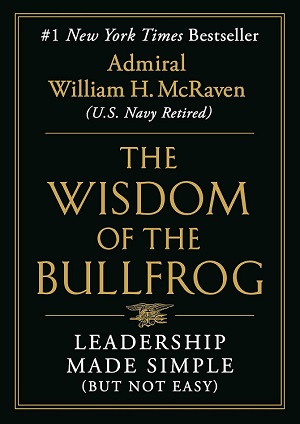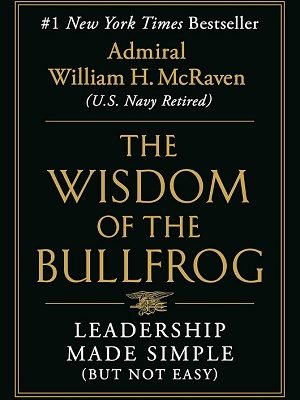The Wisdom of the Bullfrog: Leadership Made Simple by Admiral William H. McRaven is a powerful and insightful book that distills the essence of leadership into actionable lessons drawn from the author’s extensive experience in the U.S. Navy and his time as a SEAL commander. Known for his previous bestselling book, Make Your Bed, McRaven’s The Wisdom of the Bullfrog takes a deeper dive into the qualities and principles that make great leaders.
In this comprehensive guide, we explore all the key lessons discussed in the book and how they can help individuals become better leaders, whether in business, the military, or everyday life.

Read: Make Your Bed
1. The Meaning of the “Bullfrog” Title: Legacy and Leadership
The title “Bullfrog” refers to the oldest active-duty Navy SEAL at any given time, a title that McRaven held during his distinguished career. McRaven uses this concept to emphasize that leadership isn’t about age or longevity, but about passing on wisdom, strength, and resilience to the next generation. Leaders, like the bullfrog, are symbols of endurance and legacy, offering guidance and support to those who follow.
- Key Insight: Leadership is not about personal glory, but about guiding others toward success and passing on valuable knowledge. A true leader’s legacy is the impact they leave on others.
Practical Application:
- Focus on building a lasting legacy through mentoring and teaching others.
- Understand that leadership is about helping those you lead grow, succeed, and become leaders themselves.
Benefits:
- Creates a strong, cohesive team that feels supported and empowered.
- Leaves a lasting positive impact on your organization or community.
2. Discipline and Accountability: Holding Yourself to High Standards
One of the core lessons in The Wisdom of the Bullfrog is the importance of discipline and accountability in leadership. McRaven stresses that great leaders are those who hold themselves and their teams to the highest standards of excellence. In the military, discipline is the foundation for success, and McRaven believes the same principles apply in any leadership role. Accountability means owning both successes and failures, learning from mistakes, and constantly striving to improve.
- Key Takeaway: Discipline creates consistency and trust, while accountability fosters growth and improvement. Without these, a leader cannot command respect or inspire others.
Practical Application:
- Set clear standards for yourself and your team, and ensure everyone adheres to them.
- Accept responsibility for your actions and decisions, and encourage your team to do the same.
- Establish routines that promote discipline, such as setting regular goals and tracking progress.
Benefits:
- Builds trust and credibility within your team or organization.
- Promotes a culture of excellence and continuous improvement.
3. The Importance of Humility: Leading with a Servant’s Heart
McRaven highlights humility as a critical trait for leaders. A great leader doesn’t lead to be admired or praised but to serve the people and mission they are responsible for. Humility allows leaders to stay grounded, learn from others, and make decisions based on what’s best for the team rather than their ego. This principle is especially important in difficult situations where pride can lead to poor decision-making.
- Key Insight: True leadership is about service, not self-promotion. Humble leaders are more likely to earn the respect and loyalty of their teams.
Practical Application:
- Regularly seek feedback from your team and be open to their insights.
- Make decisions based on what’s best for the group, even if it means putting your own desires aside.
- Lead by example—show that no task is beneath you.
Benefits:
- Fosters stronger relationships with your team.
- Encourages collaboration and mutual respect within your organization.
4. Mental and Physical Toughness: The Foundation of Resilience
In his military career, McRaven experienced extreme physical and mental challenges, and he believes that toughness is a vital quality for any leader. Toughness means being able to withstand adversity, handle stress, and keep moving forward even when things get difficult. Both mental and physical toughness are crucial in leadership because they allow you to stay composed and focused under pressure, ensuring that you can guide your team through any situation.
- Key Takeaway: Resilience, both mental and physical, enables leaders to navigate challenges, inspire confidence, and make sound decisions in high-pressure situations.
Practical Application:
- Develop habits that build mental toughness, such as setting small, challenging goals and pushing through discomfort.
- Engage in regular physical exercise to improve stamina and resilience, as physical health influences mental strength.
- Cultivate a positive mindset that embraces challenges as opportunities to grow stronger.
Benefits:
- Greater ability to stay calm and composed during crises.
- A leadership style that inspires others to remain resilient in the face of adversity.
5. Adaptability: Navigating Change with Confidence
McRaven discusses the importance of adaptability in leadership, especially in rapidly changing environments. The ability to pivot and adjust to new circumstances is what separates successful leaders from those who struggle. In the Navy SEALs, the capacity to adapt to new information or unexpected challenges is critical for mission success. McRaven applies this lesson to leadership, emphasizing that leaders must be flexible and open to change to thrive in any setting.
- Key Insight: Adaptable leaders can respond effectively to unforeseen challenges and seize new opportunities, ensuring long-term success for themselves and their teams.
Practical Application:
- Encourage innovation and creative problem-solving within your team.
- Be willing to change strategies when circumstances shift, rather than clinging to old methods that no longer work.
- Stay informed and continuously learn so you can anticipate changes and prepare accordingly.
Benefits:
- Greater agility in navigating complex and unpredictable situations.
- A team that feels empowered to innovate and take initiative.
6. Courage Under Fire: Leading with Bravery in Difficult Situations
A leader’s courage is often tested in difficult moments, whether in life-threatening military operations or high-stakes business decisions. McRaven teaches that courage is essential in leadership, as it allows leaders to make tough decisions and take necessary risks. Courage isn’t about the absence of fear, but the ability to act in spite of it. Leaders must have the courage to take action, make decisions, and stand by their values, even when it’s unpopular or risky.
- Key Takeaway: Courageous leaders inspire confidence and trust in their teams. Their bravery in tough situations sets the tone for the entire organization.
Practical Application:
- Make decisions that align with your values and mission, even when it’s difficult or uncomfortable.
- Lead by example by stepping up in challenging situations and showing your team that you’re willing to take calculated risks.
- Develop your courage by consistently stepping out of your comfort zone and embracing challenges.
Benefits:
- Increased trust and loyalty from your team.
- A culture of boldness and innovation where team members feel safe to take risks.
7. Teamwork and Collaboration: The Power of Unity
McRaven emphasizes that no leader succeeds alone—teamwork is the foundation of any successful mission or organization. In the Navy SEALs, every operation relies on the collective strength and unity of the team. The same principle applies to leadership in any context. Leaders must build cohesive, high-performing teams by fostering trust, collaboration, and shared goals.
- Key Insight: A leader’s success is directly tied to the success of their team. Strong leaders empower their teams to work together and support each other.
Practical Application:
- Foster a team environment where open communication, trust, and collaboration are prioritized.
- Ensure that each team member understands their role and how it contributes to the overall mission.
- Recognize and celebrate team achievements to build morale and a sense of unity.
Benefits:
- A more cohesive, motivated team that works toward common goals.
- Increased efficiency and productivity as a result of collaboration and trust.
8. Integrity: The Foundation of Leadership
At the core of McRaven’s leadership philosophy is integrity. Without it, no leader can truly earn the respect of their team. Integrity means doing the right thing, even when no one is watching, and making decisions based on ethical principles. Leaders who lack integrity will eventually lose the trust of those they lead. McRaven emphasizes that a leader’s word must be their bond, and their actions must consistently reflect their values.
- Key Takeaway: Integrity is non-negotiable in leadership. It builds trust, credibility, and a strong foundation for lasting success.
Practical Application:
- Always be honest and transparent in your communications with your team.
- Make decisions that align with your core values and the mission, even when it’s difficult.
- Hold yourself and your team accountable to high ethical standards.
Benefits:
- Greater trust and loyalty from your team and peers.
- A reputation as a dependable and ethical leader.
Conclusion
The Wisdom of the Bullfrog by Admiral William H. McRaven offers a simple yet profound blueprint for effective leadership. Through discipline, humility, adaptability, courage, and integrity, leaders can build successful teams and organizations that thrive in any environment. McRaven’s lessons, rooted in his military experience, are applicable to leaders in all walks of life, from business executives to educators and community leaders.
By focusing on service, accountability, teamwork, and resilience, leaders can inspire and empower those around them, leaving a lasting legacy of excellence and positive impact. Whether you’re leading in the boardroom or on the battlefield, McRaven’s wisdom provides the tools needed to become a better, more effective leader (Amazon).



